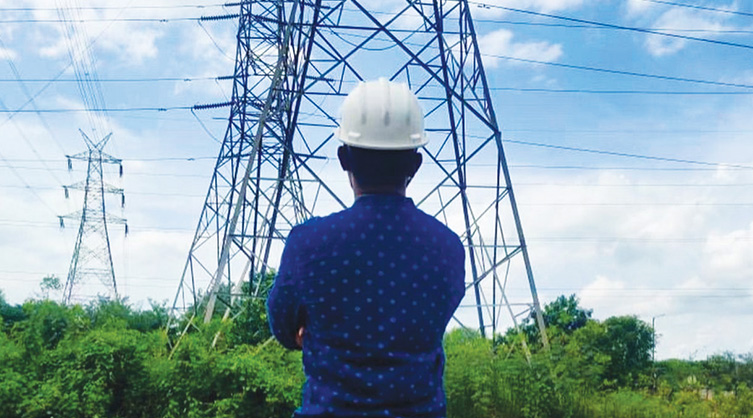Digital tech enhances the efficiency of ERS Towers
By EPR Magazine Editorial July 31, 2023 2:52 pm IST
By EPR Magazine Editorial July 31, 2023 2:52 pm IST

The following essay discusses the need to implement modern, cutting-edge technology in ERS Towers and how these technologies assist rural grids in crisis management during transmission line disconnects.
In an era where power is a basic necessity, utilities must strengthen their infrastructure to accommodate the changes posed by the transfer and deregulation of reliable power to consumers. The primary concern for emergency restoration is reviving transmission networks, getting the lines charged, and ensuring operations within the designated time frame. These core objectives have led to the development of the Emergency Restoration Structure (ERS) within the energy sector.
The energy produced at mega power plants is transmitted over longer distances with the help of dedicated electric power transmission systems for use by end customers. Electric transmission towers remain the most crucial component in any power transmission system. A transmission tower is also known as a power transmission tower, an electricity pylon, or simply a power tower. It is available as a tall structure that helps support an overhead power line.
Electrical or power grids help carry high-voltage transmission lines responsible for transporting bulk electric power from generating power stations to electrical substations. The commonly observed utility poles help support low-voltage sub-transmission and distribution lines for transporting power from substations to electric users.
Reinventing resilience in ERS towers for enhanced power grid stability
Transmission towers are vulnerable to collapsing under heavy winds and storms. Due to specific limitations concerning the overall design and resource constraints, transmission power line towers can only be designed to withstand some sort of calamities. This, combined with the fact that the transmission system in India features low redundancy, leads to serious complications in addressing line diversions or tower collapses.
Advait Infra, a pioneering name in the infra-technology sector, has developed a revolutionary solution to address these power line problems. With the help of cutting-edge ERS in the power sector, the problem of collapsing power towers can be resolved. Let us enlighten you about the same in detail.
The cutting-edge features of ERS towers in disaster management
The ERS towers in the power sector feature temporary towers used for electrical or power transmission lines. The ERS features a modular construction designed with hot-dip galvanised steel, aluminium alloy, or a blend of both. The easy-to-erect power towers are raised in the field quickly, within 24 hours. Moreover, these are used for addressing power line tripping or outages in emergencies, line diversions, maintenance requirements, or several other applications. It is a successful technique to help with effective disaster management in the power sector.
Due to its emergency nature, the revolutionary ERS tower technology is instrumental in remote and rural areas where it might take several days to resolve common power-related emergencies.
Advanced data analytics and digitisation are being used to improve the overall design, construction, and operation of transmission towers. It includes using advanced software and simulations to optimise the tower designs and predict the overall performance. Sensors, in integration with advanced technologies like AI and smart grids, are increasingly used to evaluate the overall condition of electricity towers and predict potential issues.
Empowering rural power grids through Advait Infra’s ERS towers
Advait Infra emphasises the importance of ERS towers in revolutionising the modern power sector of the nation, especially across rural and remote areas. There are several benefits to a dedicated ERS tower system, including:
• There is no need for a dedicated foundation.• Bypassing critical towers
• Minimisation of inventory
• Standardised design according to the IEEE 1070
• User-friendly
• Rapid restoration of collapsing transmission lines
• There is no requirement for civil engineering work.
• Avoidance of social and political costs
Growing demands for electricity and the increasing rate of industrialisation in rural and remote areas drive the growth of the electricity transmission market in the country. The increasing rate of bulk electricity transmission and ageing infrastructure across rural areas drive the development of the power transmission tower industry. The ERS tower installation process is being optimised to overcome on-site challenges, minimising labour effort with rapid installation and intricately observing the safety parameters.
Efforts to minimise the environmental impact of ERS towers
In the modern range of cutting edge ERS towers, aspects like lineman safety, convenience, and environmental impacts are considered to meet diverse needs. Advanced ERS towers are compatible with almost all commercially available units, making the lineman feel safe when using unfamiliar gear. High-strength steel’s fully standardised fabrication procedure has made it highly economical, structurally stable, and functionally reliable.

A robust power delivery or transmission infrastructure is required to ensure round-the-clock power for all, including those in rural or remote areas. In this context, an attempt with ERS tower installation has been made by industry players like Advait Infra to review existing aspects concerning optimal economic planning of ageing transmission lines across rural areas.
This article has been authored by Mr. Shalin Sheth, Founder & Managing Director, Advait Infratech. For more details, visit: https://advaitinfra.com/
We use cookies to personalize your experience. By continuing to visit this website you agree to our Terms & Conditions, Privacy Policy and Cookie Policy.